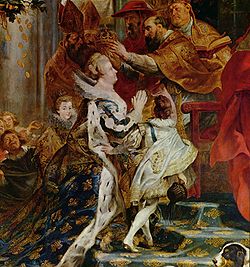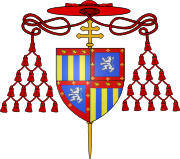
François de Joyeuse
Encyclopedia


France
The French Republic , The French Republic , The French Republic , (commonly known as France , is a unitary semi-presidential republic in Western Europe with several overseas territories and islands located on other continents and in the Indian, Pacific, and Atlantic oceans. Metropolitan France...
churchman and politician.
Born at Carcassonne
Carcassonne
Carcassonne is a fortified French town in the Aude department, of which it is the prefecture, in the former province of Languedoc.It is divided into the fortified Cité de Carcassonne and the more expansive lower city, the ville basse. Carcassone was founded by the Visigoths in the fifth century,...
, François de Joyeuse was the second son of Guillaume de Joyeuse and Marie Eléanor de Batarnay. As the younger son of a seigneur
Lord
Lord is a title with various meanings. It can denote a prince or a feudal superior . The title today is mostly used in connection with the peerage of the United Kingdom or its predecessor countries, although some users of the title do not themselves hold peerages, and use it 'by courtesy'...
in an intensely religious family of bishops and soldiers, he was destined for a career in the church. He studied in Toulouse, then at the Collège de Navarre
Collège de Navarre
The College of Navarre was one of the colleges of the historic University of Paris, rivaling the Sorbonne and renowned for its library. It was founded by Queen Joan I of Navarre in 1305, who provided for three departments, the arts with 20 students, philosophy with 30 and theology with 20...
, Paris, and received his doctorate degrees in canon and civil law at the University of Orléans
University of Orléans
-History:In 1230, when for a time the doctors of the University of Paris were scattered, a number of the teachers and disciples took refuge in Orléans; when pope Boniface VIII, in 1298, promulgated the sixth book of the Decretals, he appointed the doctors of Bologna and the doctors of Orléans to...
. Thanks to the influence of his elder brother Anne de Joyeuse
Anne de Joyeuse
Anne de Batarnay de Joyeuse, Baron d'Arques, Vicomte then Duke of Joyeuse was a royal favourite and active participant in the French Wars of Religion....
, a favourite
Favourite
A favourite , or favorite , was the intimate companion of a ruler or other important person. In medieval and Early Modern Europe, among other times and places, the term is used of individuals delegated significant political power by a ruler...
of King Henry III of France
Henry III of France
Henry III was King of France from 1574 to 1589. As Henry of Valois, he was the first elected monarch of the Polish-Lithuanian Commonwealth with the dual titles of King of Poland and Grand Duke of Lithuania from 1573 to 1575.-Childhood:Henry was born at the Royal Château de Fontainebleau,...
who created him duke and peer in 1581, he became a privy councillor to the King and rose rapidly in the church. He was made Archbishop of Narbonne on 20 October 1581 (with a papal dispensation for not having reached canonical age), a cardinal
Cardinal (Catholicism)
A cardinal is a senior ecclesiastical official, usually an ordained bishop, and ecclesiastical prince of the Catholic Church. They are collectively known as the College of Cardinals, which as a body elects a new pope. The duties of the cardinals include attending the meetings of the College and...
on 12 December 1583 (still aged only 21), Archbishop of Toulouse on 4 November 1588, and Archbishop of Rouen
Archbishop of Rouen
The Roman Catholic Archdiocese of Rouen is an Archdiocese of the Latin Rite of the Roman Catholic Church in France. As one of the fifteen Archbishops of France, the ecclesiastical province of the archdiocese comprises the majority of Normandy....
on 1 December 1604. He was a chevalier of the Order of Saint-Esprit.
His brothers Anne and Claude were captured in 1587 after the Battle of Coutras
Battle of Coutras
The Battle of Coutras, fought on 20 October 1587, was a major engagement in the eighth and final war of the French Religious Wars between an army under Henry of Navarre and a royal army led by Anne, Duke of Joyeuse...
and killed in the general massacre that followed. As a result, François became Duke of Joyeuse. In 1590 the title of Duke of Joyeuse was passed to another of his younger brothers, Scipion, who drowned himself in the Tarn after the defeat of Villemur in 1592, then to Henri de Joyeuse, the youngest brother, who died in 1608. The title passed to Henri's daughter Henriette
Henriette Catherine de Joyeuse
Henriette Catherine de Joyeuse was the daughter of Henri de Joyeuse and Catherine de Nogaret. She married her first husband, Henri de Bourbon, Duke of Montpensier, on 15 May 1597 and her second husband, Charles, Duke of Guise, on 6 January 1611.- Marriages and children :From her first marriage to...
, who had married Henri de Montpensier in 1597.
On 16 February 1587 he was appointed by Henry III French minister to the Holy See
Holy See
The Holy See is the episcopal jurisdiction of the Catholic Church in Rome, in which its Bishop is commonly known as the Pope. It is the preeminent episcopal see of the Catholic Church, forming the central government of the Church. As such, diplomatically, and in other spheres the Holy See acts and...
, cardinal protector of France
Cardinal protector
Since the thirteenth century it has been customary at Rome to confide to some particular Cardinal a special solicitude in the Roman Curia for the interests of a given religious order or institute, confraternity, church, college, city, nation etcetera. Such a person is known as a Cardinal Protector...
; he retained his predecessor's secretary, Arnaud d'Ossat
Arnaud d'Ossat
Arnaud d'Ossat was a French diplomat and writer, and a Cardinal of the Roman Catholic Church, whose personal tact and diplomatic skill steered the perilous course of French diplomacy with the Papacy in the reign of Henry IV of France.-Early life and studies:Arnaud d'Ossat was born at...
, a skilled diplomat with long experience in Rome who served as liaison with the papacy during Joyeuse's numerous absences. Joyeuse returned to France after King Henry's murder in 1589 and joined the Catholic League
Catholic League (French)
The Catholic League of France, sometimes referred to by contemporary Roman Catholics as the Holy League, a major player in the French Wars of Religion, was formed by Duke Henry of Guise in 1576...
. However, he broke with the League in 1593 to support Henry of Navarre
Henry IV of France
Henry IV , Henri-Quatre, was King of France from 1589 to 1610 and King of Navarre from 1572 to 1610. He was the first monarch of the Bourbon branch of the Capetian dynasty in France....
(King Henry IV of France), and returned to Rome where he obtained papal absolution for Henry from Pope Clement VIII in 1595. Reappointed cardinal protector in January 1596, he returned to France and was returned to Rome by Henry IV in September 1598, arriving the following February; that year he negotiated the annulment of King Henry's marriage to Marguerite de Valois
Marguerite de Valois
Margaret of Valois was Queen of France and of Navarre during the late sixteenth century...
, opening the way for a second marriage to Marie de' Medici
Marie de' Medici
Marie de Médicis , Italian Maria de' Medici, was queen consort of France, as the second wife of King Henry IV of France, of the House of Bourbon. She herself was a member of the wealthy and powerful House of Medici...
.
François became Archbishop of Rouen
Archbishop of Rouen
The Roman Catholic Archdiocese of Rouen is an Archdiocese of the Latin Rite of the Roman Catholic Church in France. As one of the fifteen Archbishops of France, the ecclesiastical province of the archdiocese comprises the majority of Normandy....
in 1604, though he did not take up residence. He participated in the papal conclaves of 1605. In 1606-07 he played a decisive role in negotiating a rapprochement between the Papacy and Venice, at the time of the Venetian Interdict
Venetian Interdict
The Venetian Interdict of 1606 and 1607 was the expression in terms of canon law, by means of a papal interdict, of a diplomatic quarrel and confrontation between the Papal Curia and the Republic of Venice, taking place in the period from 1605 to 1607...
. After the murder of Henry IV in 1610 he lost influence at the court of the Regent, Marie de' Medici. He died at Avignon
Avignon
Avignon is a French commune in southeastern France in the départment of the Vaucluse bordered by the left bank of the Rhône river. Of the 94,787 inhabitants of the city on 1 January 2010, 12 000 live in the ancient town centre surrounded by its medieval ramparts.Often referred to as the...
, aged 53, while travelling to Rome.

